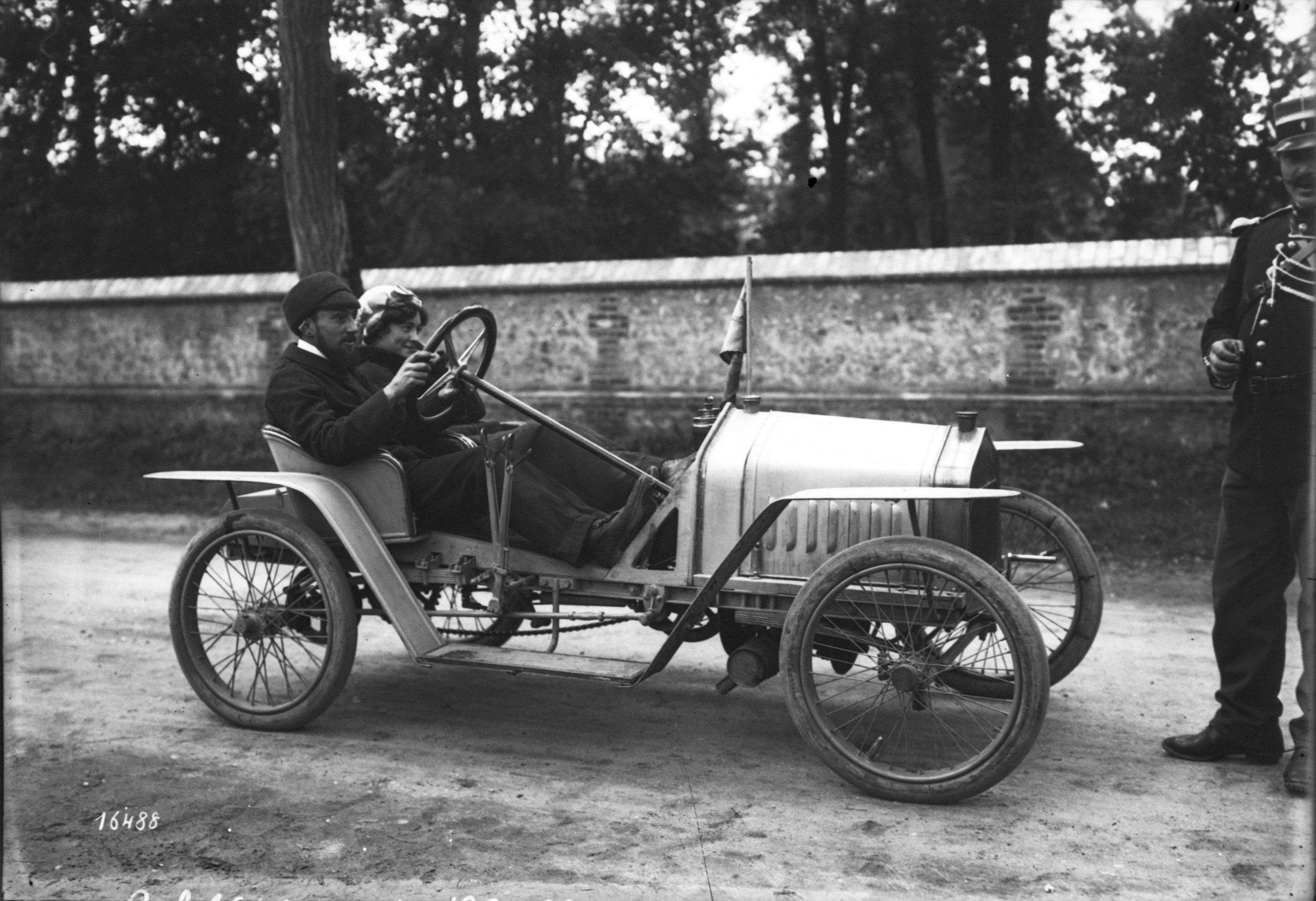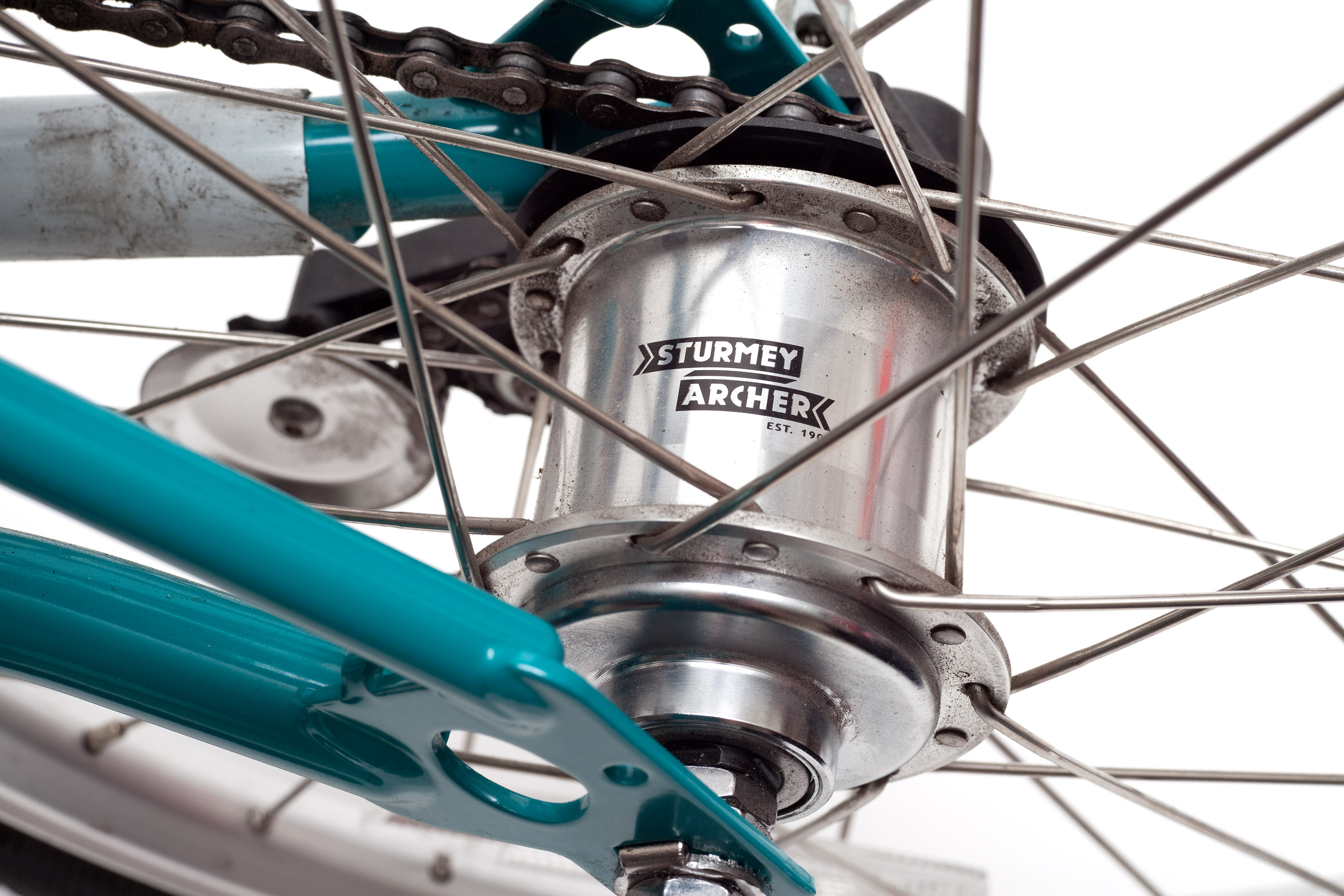|
Gibbons (automobile)
The Gibbons was a British 4 wheeled cyclecar made from 1917 to 1929 by engineering pattern makers Gibbons and Moore of Chadwell Heath, Essex. The first car was made in 1914 but production did not start until 1917. By 1920 the car was described as the MkIII. The car was unusual in having the air-cooled engine mounted outside the body on the front right hand side The first cars had a basic 2 seater body with the seats side by side and 4 hp single-cylinder, four-stroke JAP engine. Subsequent cars had a variety of engines, some with two cylinders. The engine drove a countershaft mounted across the car. From this two forward gears were provided by belts to either of the rear wheels with ratios selected by clutches on different diameter pulleys on either end of the countershaft. Braking was by blocks bearing on the drive pulleys. The bodywork was made of plywood and as well as side by side, tandem seating was also available on a version advertised as the Sport model with room ... [...More Info...] [...Related Items...] OR: [Wikipedia] [Google] [Baidu] |
Cyclecar
A cyclecar was a microcar, type of small, lightweight and inexpensive Automobile, car manufactured in Europe and the United States between 1910 and the early 1920s. The purpose of cyclecars was to fill a gap in the market between the motorcycle and the car. A key characteristic was that it could only accommodate two passengers sitting tandem style or passenger behind the driver. The demise of cyclecars was due to larger cars – such as the Citroën Type C 5HP, Citroën Type C, Austin 7 and Morris Cowley – becoming more affordable. Small, inexpensive vehicles reappeared after World War II, and were known as microcars. Characteristics Cyclecars were propelled by engines with a Single-cylinder engine, single cylinder or V-twin engine, V-twin configuration (or occasionally a inline-four engine, four cylinder engine), which were often air-cooled. Sometimes motorcycle engines were used, in which case the motorcycle gearbox was also used. All cyclecars were required to ha ... [...More Info...] [...Related Items...] OR: [Wikipedia] [Google] [Baidu] |
Chadwell Heath
Chadwell Heath is an area in east London, England. It is situated on the boundary of the London Borough of Barking and Dagenham and the London Borough of Redbridge, around west of Romford and east of Ilford, and north-east of Charing Cross. The name was first used in the 17th century for a settlement in the parish of Dagenham in Essex, which later absorbed the neighbouring hamlet of Chadwell Street in the parish of Barking (later Ilford). Chadwell Heath railway station, on the Great Eastern Main Line, opened in 1864, connecting the area to Central London. After the First World War, the area developed as a residential suburb and formed the northern limit of the Becontree estate, causing an increase in population density. The area became part of Greater London in 1965. The area is home to the Chadwell Heath Academy. It was the final residence of Eva Hart, a survivor of the , and a local pub (housed in the former Police Station) is named after her. History Toponymy The name ... [...More Info...] [...Related Items...] OR: [Wikipedia] [Google] [Baidu] |
JA Prestwich Industries Ltd
JA Prestwich Industries, was a British engineering equipment manufacturing company named after founder John Alfred Prestwich, which was formed in 1951 by the amalgamation of J.A.Prestwich and Company Limited and Pencils Ltd. History John Prestwich, an engineer, commenced manufacture of scientific instruments in 1895, when he was 20, initially behind his father's house at 1 Lansdowne Road, Tottenham, London. By 1911 he had moved to new premises in Tariff Road, within the Northumberland Park area of Tottenham, London, anwhich still exists as of 2015 Prestwich was initially best known for his cinematography cameras and projectors. He worked with S.Z. de Ferranti and later the cinema pioneer William Friese-Greene. Circa 1902 J.A.Prestwich and Company began manufacturing motorcycle engines which were used in many motorcycle marques. The motorcycle engines were associated with racing and record success and were used in speedway bikes into the 1960s. Prestwich also made engines for ... [...More Info...] [...Related Items...] OR: [Wikipedia] [Google] [Baidu] |
Blackburne (motorcycles)
Blackburne was a trade name of Burney and Blackburne Limited a British manufacturer of motorcycles from 1913 to 1922 at Tongham near Farnham, Surrey. They were also a major supplier of engines to other motor cycle and light car makers and continued to make these until 1937. Burney and Blackburne also made small aircraft engines. Blackburne Motorcycles The origins of the Blackburne motorcycle engine start with Geoffrey de Havilland, who had designed and built a motor cycle before he became interested in aviation. In about 1905 he sold the designs and patterns to two student friends for £5 when he was short of money, and they went on to form the Blackburne engine company. A patent for adjustable belt pulleys for motorcycles dating back to 1912, shows Cecil Stanley Burney, Edward Alexander (Alick) Burney, and pioneer aviator Harold Blackburn trading as Burney and Blackburne (not Blackburn), operating from Northchurch, Berkhamsted. They were incorporated shortly afterwards a ... [...More Info...] [...Related Items...] OR: [Wikipedia] [Google] [Baidu] |
Sturmey Archer
Sturmey-Archer was a manufacturing company originally from Nottingham, England. It primarily produced bicycle hub gears, brakes and a great many other sundry bicycle components, most prominently during their heyday as a subsidiary of the Raleigh Bicycle Company. In the past, it also manufactured motorcycle hubs, gearboxes and engines. The company was founded in 1902 by Henry Sturmey and James Archer under the guidance of Frank Bowden, the primary owner of Raleigh. In 2000, the assets and trademarks of Sturmey-Archer were sold to Sun Race of Taiwan which was renamed Sun Race Sturmey-Archer Inc. and production moved to Taiwan. Products All Sturmey-Archer gear hubs use epicyclic (planetary) geartrains of varying complexity. The AW is the simplest, using one set of planetary gears with four planets. The AM uses three compound planets with differently sized cogs machined from a common shaft to engage the gear ring and sun gear separately, while the close-ratio three-speeds, an ... [...More Info...] [...Related Items...] OR: [Wikipedia] [Google] [Baidu] |
List Of Car Manufacturers Of The United Kingdom
:''This list is incomplete. You can help by adding correctly sourced information about other manufacturers.'' As of 2018 there are approximately 35 active British car manufacturers and over 500 defunct British car manufacturers. This page lists car manufacturers that build or built cars in the United Kingdom. Major current marques Current manufacturers ;A * AC (1908–present) * Alvis (2012–present) * Arash (2006–present) * Ariel (1999–present) *''Aston Martin'' (1913–present) * Atalanta Motors (2011–present) ;B *''Bentley Motors'' (1919–present) *Bowler Offroad (1985–present) * BAC (2009–present) * Brooke (1991–present) ;C * Caterham (1973–present) ;D * David Brown (2013–present) ;E * Eagle E-Types (2013–present) * Elemental Cars (2014–present) ;G *Gibbs (2004–present) * Ginetta (1957–present) * Grinnall (1993–present) * Gardner Douglas Sports Cars (1990–present) * Great British Sports Cars (2006–present) ;H *Hawk (1986–pre ... [...More Info...] [...Related Items...] OR: [Wikipedia] [Google] [Baidu] |
Cyclecars
A cyclecar was a type of small, lightweight and inexpensive car manufactured in Europe and the United States between 1910 and the early 1920s. The purpose of cyclecars was to fill a gap in the market between the motorcycle and the car. A key characteristic was that it could only accommodate two passengers sitting tandem style or passenger behind the driver. The demise of cyclecars was due to larger cars – such as the Citroën Type C, Austin 7 and Morris Cowley – becoming more affordable. Small, inexpensive vehicles reappeared after World War II, and were known as microcars. Characteristics Cyclecars were propelled by engines with a single cylinder or V-twin configuration (or occasionally a four cylinder engine), which were often air-cooled. Sometimes motorcycle engines were used, in which case the motorcycle gearbox was also used. All cyclecars were required to have clutches and variable gears. This requirement could be fulfilled by even the simplest devices ... [...More Info...] [...Related Items...] OR: [Wikipedia] [Google] [Baidu] |
Defunct Motor Vehicle Manufacturers Of England
Defunct (no longer in use or active) may refer to: * ''Defunct'' (video game), 2014 * Zombie process or defunct process, in Unix-like operating systems See also * * :Former entities * End-of-life product An end-of-life product (EOL product) is a product at the end of the product lifecycle which prevents users from receiving updates, indicating that the product is at the end of its useful life (from the vendor's point of view). At this stage, a ... * Obsolescence {{Disambiguation ... [...More Info...] [...Related Items...] OR: [Wikipedia] [Google] [Baidu] |
Kit Car Manufacturers
Kit may refer to: Places *Kitt, Indiana, US, formerly Kit * Kit, Iran, a village in Mazandaran Province * Kit Hill, Cornwall, England People * Kit (given name), a list of people and fictional characters * Kit (surname) Animals * Young animals: ** A short form of kitten, a young cat ** A young beaver ** A young ferret ** A young fox ** A young mink ** A young rabbit ** A young raccoon ** A young skunk ** A young squirrel ** A young wolverine * Old collective noun for a group of pigeons flying together Kinds of sets * Standard equipment and attire in sports: ** Kit (association football) ** Kit (cycling) ** Kit (rugby football) * Kit (of components), a set of components such as ** Electronic kit ** Kit car or component car **Testing kit (other) Other uses * Kit lens, a low-end SLR camera lens * Kit violin or kit, a small stringed musical instrument * Tropical Storm Kit, tropical cyclones named Kit * ''Whale (film)'', 1970, Bulgarian title See also * * * KIT (dis ... [...More Info...] [...Related Items...] OR: [Wikipedia] [Google] [Baidu] |



